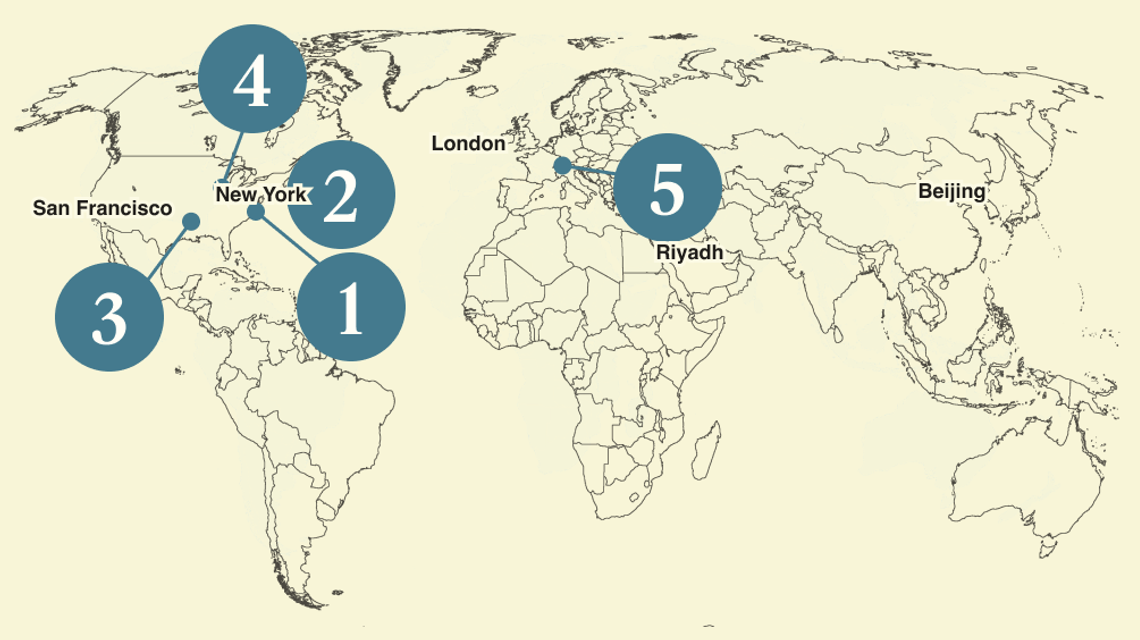| | In this edition, a brewing fight for more energy, lower rates, and why Goldman is eyeing M&A deals f͏ ͏ ͏ ͏ ͏ ͏ |
| |  | Business |  |
| |
|
 - Trump’s Fed conundrum
- Goldman hunts big game
- New “America-first” studio
- MAHA’s strange markets
- Paying for AI’s energy
|
|
 There’s an old adage that doctors make the worst patients. Goldman Sachs is about to find out whether investment bankers make bad clients. CEO David Solomon is seeking a needle-moving acquisition, as you’ll read below, figuring he can buy the heft and cachet that would take years to build organically. He’s shopping with a good currency, friendly regulators in Washington, and a license to maneuver that was hard-won by quelling an internal rebellion and cleaning up a consumer-banking mess. Despite its unparalleled reputation for doling out M&A advice, Goldman has essentially no track record in doing deals itself, much less good ones. Convinced of its own smarts, it has preferred to build rather than buy, and it tends to spit out outsiders like rejected organs. Unlike rivals including JPMorgan and Morgan Stanley, it has never done a transformative deal, sticking to mostly forgettable tuck-ins. Its two largest deals, for J. Aron in 1981 and Spear, Leeds & Kellogg in 2000, were done at peaks of the commodities and stock-options markets, respectively, and had long, painful tails. (J. Aron’s key asset turned out to be its talent, which included future CEO Lloyd Blankfein, along with Gary Cohn and Tim O’Neill.) Solomon knows this history and, as a trained investment banker, also knows that most deals destroy value. That he’s on the hunt anyway shows the limits to Goldman’s historic insularity and the high stakes in Wall Street’s race for assets. Goldman manages three times as much money as Blackstone but lacks its cachet in the sexier corners of money management. Personnel is policy at big companies, and the passing of the torch from Goldman’s traders to its bankers may finally be showing up in operations. Blankfein never had much appetite for deals, preferring instead to use the firm’s capital to feed the trading arm he had grown up in. A dealmaker is running the firm now, so don’t be surprised to see deals. |
|
Trump’s interest rate tug-of-war |
 Ken Cedeno/Reuters Ken Cedeno/ReutersThe Trump administration’s quandary as the president ramps up pressure on Jerome Powell: If the economy is so hot, why should the Fed cut rates? Data is increasingly showing the US economy shrugging off tariffs and uncertainty. Unemployment remains historically low, and consumer sentiment is climbing after bottoming out this spring. Treasury Secretary Scott Bessent this morning boasted of a “CapEx Comeback,” pointing to surging levels of business investment, which will get a boost from a corporate deduction provision in Trump’s big spending-and-tax bill. That’s a told-you-so moment for the White House, whose critics predicted the bottom would fall out. But it complicates President Donald Trump’s efforts to pressure the Fed to reduce borrowing costs, a tool for an ailing economy. House Speaker Mike Johnson embodied the contradiction last week when he said “the American economy is hot” and that “we should reduce interest rates” in an interview on CNBC, whose hosts quickly pointed out the problem. |
|
 Brendan McDermid/File Photo/Reuters Brendan McDermid/File Photo/ReutersGoldman Sachs is looking for deals — not for its bankers, but for itself. The firm held takeover talks with $25 billion Northern Trust earlier this year and nearly clinched a $6 billion deal for private-markets specialist Cliffwater, Semafor scooped Monday. The firm has also put out M&A feelers in the world of low-fee ETFs, where it has struggled to grow. The appetite for deals of this size — either would be Goldman’s largest ever — shows that CEO David Solomon, who survived an internal and investor revolt over a disastrous foray into consumer banking, is feeling newly emboldened. He is looking to grow the firm’s asset-management arm and has a valuable currency to spend: Goldman’s stock is at all-time highs, up nearly 50% from a year ago. |
|
Palantir execs back America-first films |
 Screenshot from Founders Films deck Screenshot from Founders Films deckA trio of Silicon Valley executives think they can create a parallel media landscape focused on American exceptionalism, Semafor’s Max Tani scooped. Palantir chief technology officer, Shyam Sankar, alongside investors Ryan Podolsky and Christian Garrett, are circulating a fundraising deck for Founders Films, a new production company based in Dallas. It will produce “projects about American exceptionalism, name America’s enemies, back artists unconditionally, take risk on novel IP.” The project’s name echoes that of Peter Thiel’s Founders Fund, and both Palantir and Garrett have close ties to the investor, a key figure on the new right. Founders Films’ output would range from tales of Israeli and American military heroism — Palantir is a defense-tech leader — to a three-part treatment of Ayn Rand’s Atlas Shrugged. “The American Brand is broken. Hollywood is AWOL. Movies have become more ideological, more cautious, and less entertaining,” the deck says. (Filmmaker Ari Aster made a similar, though less politically tinged, complaint in the latest episode of Semafor’s Mixed Signals podcast. His answer, in theaters now, is a COVID-era western where smartphones take the place of guns.) |
|
Companies aligning with MAHA means… cane sugar and beef fat? Coca-Cola announced today it would introduce a new version of its iconic beverage sweetened with cane sugar, not corn syrup — sending corn growers into a panic. (The US also doesn’t produce enough sugar and so Coca-Cola would have to import it, potentially increasing shelf prices and adding to the trade deficit that Trump is trying to tackle.) PepsiCo, meanwhile, announced a health-forward version of its flagship drink.  If the politics of the “Make America Healthy Again” movement are curious, uniting far-right conspiracy theorists and far-left granola enthusiasts, so is the business of MAHA. Shares of the parent company of Steak ‘N Shake, which has embraced bitcoin and beef tallow, are up 28% this year, while Sweetgreen’s are down 55%. As one frustrated lobbyist told me last week in Washington, “It’s strange that nowhere in the MAHA game plan is ‘eat some vegetables.’” |
|
Where will AI’s power come from? |
 Leah Millis/File Photo/Reuters Leah Millis/File Photo/ReutersAs AI data centers sprout up, concerns are mounting over where the energy to power them comes from, and how to pay for it. US-regulated utilities asked for a record $29 billion in rate increases in the first half of 2025 alone, double last year’s level, essentially passing the cost on to customers. The next datapoint will come later today when the country’s largest grid network, PJM Interconnection — which also hosts the world’s largest concentration of data centers — releases the results of its annual power auction. The UN’s secretary general on Tuesday called on big tech companies to move to 100% sustainable energy to fuel their AI ambitions. “AI can boost efficiency, innovation and resilience in energy systems, but it is also energy hungry,” António Guterres said in New York. Amazon, Google, and Meta offset some of their carbon emissions through credits or other programs and include renewable energy in their power mix. But with data-center consumption expected to double by 2030 to 945 terawatt-hours, the cheapest and most plentiful source is natural gas. That was clear last week in Pittsburgh, where Trump headlined an “Energy and Innovation Summit” in the heart of shale country. Toby Rice, CEO of producer EQT, was on hand to announce several new projects. “Energy dominance means our tech guys can run full throttle,” Rice said. “The tech crowd, they care about cost, they care about reliability. But people still care about the carbon aspects,” he said, noting EQT’s carbon-capture projects. |
|
 From startup unicorns to Fortune 500 boardrooms, The Hustle is your daily window into the business and tech moves that matter most. With breezy, insider-minded reporting that keeps you sharp in just 5 minutes, The Hustle delivers the essential intel that 2M+ professionals use to gain their edge. Subscribe for free. |
|
➚ BUY: DeepMind. Google’s AI skunkworks notched a gold medal ranking in the International Math Olympiad, the first time that a machine ever achieved that status. ➘ SELL: Deep state. Lockheed Martin’s actual Skunk Works, on the other hand, caused a $1.6 billion charge for the company this quarter, thanks to a writedown from classified government projects. |
|
 Companies & Deals- Star-crossed: Stargate, the $500 billion AI project backed by SoftBank and OpenAI, has yet to finalize a single data center deal since it launched six months ago, WSJ reports, in part because of disagreements between Masayoshi Son and Sam Altman on where the facilities should be built.
- Front-door entry: Betting platform Polymarket is buying a small derivatives exchange as a way to legally reenter the US market after a Biden-era Justice Department probe chased it out. The Trump administration is more favorable toward prediction markets.
- Price of freedom: Bari Weiss is in talks to sell The Free Press to David Ellison’s Skydance and wants more than $200 million for the three-year-old conservative media startup, the FT reports.
- Public is the new private: Design platform Figma is seeking a $16.4 billion valuation in its upcoming public offering, which comes a year after regulators blocked the company’s $20 billion sale to Adobe.
- Manifold destiny: BP named Albert Manifold, a building-materials supply executive new to energy, as its chairman as it rolls back renewables efforts and faces pressure to cut costs.
- No-go zone: BlackRock is telling employees traveling to China on business to not use company devices while there, Bloomberg reported, as worries increase over the geopolitical tensions between Washington and Beijing. Last week, Wells Fargo restricted travel to China after one of its bankers, Chenyue Mao, was banned from leaving the country because of his involvement in “a criminal case,” Beijing said.
Watchdogs- Beltway base: OpenAI is opening an office in DC, which will serve as both a hub for the company’s policy ambitions and a showroom for visitors, Semafor’s Reed Albergotti scooped.
Markets- Safety in numbers: Trump’s escalating threats to fire Powell have investors looking for a hedge.
|
|
|